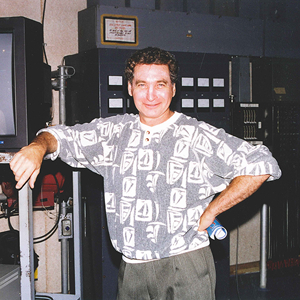
Professor Howard Lavick, seen here in 1994, is retiring after 31 years of teaching and service. He was among the faculty who formally established the School of Film and Television in 2001.
When Professor Howard Lavick retires to Southern Oregon this summer, we will be sad to see him go. But Lavick, who began teaching film courses at LMU in 1984, has left a legacy built on an uncommon foundation of wit, good humor and common sense.
It was Professor Don Zirpola who first recruited Lavick to teach three classes for a “short period of time” at the film program, then operating within LMU’s Communication Arts Department. “I needed someone to replace me on faculty,” said Zirpola, who was ascending to department chair. “I convinced him to come to the school even though he was fully engaged at SelecTV where he was in charge of interstitial programming.”
Fast-forward thirty-one years: Lavick has served the film program as associate professor, department chair, school director, acting dean, and most recently, interim associate dean. He is among a group of Founding Faculty who grew the film program from 250 students to a fully-fledged School of Film and Television with over 700 students. He was a guiding force behind the development of the SFTV International Documentary Program in Bonn, Germany. And he established the Ian Connor Student Cinematography Award to honor a cherished colleague and beloved teacher.
“Like our students now,” said Zirpola, “they loved him then as well. Students were always at the center of everything he did for the school.”
It should come as no surprise, then, that Lavick is adept at guiding his students both academically and professionally. “Professor Lavick inspired us in and outside of the classroom through his wisdom on filmmaking, but most importantly in how to stay grounded and operate in our pursuits of a career in the entertainment business morally and ethically,” said Matthew Law-Phipps (Production – B.A. ’15), a recent thesis student. “There is no sense of superiority when Professor Lavick gives his input, only care to make the best possible future for each of us.”
Before earning an M.F.A. in Film Production from the USC School of Cinema in 1977, Lavick served in Vietnam as an Army combat photographer with the 25th Infantry Division and as a reporter with Pacific Stars and Stripes. For his reporting of the South Vietnamese combat mission into Laos in 1971, he was awarded the Bronze Star Medal.
Before Professor Lavick ‘s final class, he took a moment to reflect on his tenure at the film school and to share with LogLines his future plans.
We are going to miss your sense of humor. What will you miss the most about the film school? My sense of humor. That, and Fig Newtons at our faculty meetings. Laughter can help deflate the tension of a meeting so that we can all breathe – and smile – again. So I will miss the laughter shared with many dear LMU friends during the past thirty years.
Of course, that makes total sense. What parting words of advice would you leave to your students, especially those on the verge of graduating? Work together in school. Your LMU friends will help you get your first job. Your skill, knowledge and integrity will help you to succeed and get the next one.
Is there a single accomplishment that you are most proud of achieving while at LMU? Two, actually: 1) Establishment and growing success of the SFTV Bonn program. I hope this will continue and perhaps serve as a unique model for future SFTV programs abroad as well. And 2) As Chair, helping to guide the then-Communication Arts Department through a period of stability, unprecedented growth and student accomplishments that led to our becoming a full-fledged School of Film and Television. This was due to the hard work and dedication of our faculty, staff and students. By demonstrating to the University that we were able to manage our own affairs well, we earned this opportunity. It was not handed to us.
Given the choice of the following retiree role models, which person most fits your idea of retirement and why: Jimmy Carter, Walter Cronkite, Bill Clinton, Phil Jackson, or David Burcham? Geez Louise! None of these old geezers! Well, actually Dave Burcham is taking a one year sabbatical and will spend half his time travelling in Europe, so that’s pretty cool. But I’d like to do what Henri Cartier-Bresson did – spend his life doing what he loved: photography, painting, drawing and traveling with his wife and friends. Bresson’s philosophy: “To take a photograph is to align the head, the eye and the heart. It’s a way of life.”
In all seriousness, what do you plan to do with yourself now that you are free to follow your bliss? Do you have any film projects lined up? Do you have other interests you wish to develop? Well, right now my epitaph would read: “My life was a series of unfinished projects.” So, I plan to change that and get back to doing my own creative work, finish several documentary films and renew my love of still photography. Oh, and take the time to enjoy the wineries and new life with my wife, Michaela, and family in Southern Oregon.
Anything else you would like to share? Yes. Albert Einstein had a messy desk.



